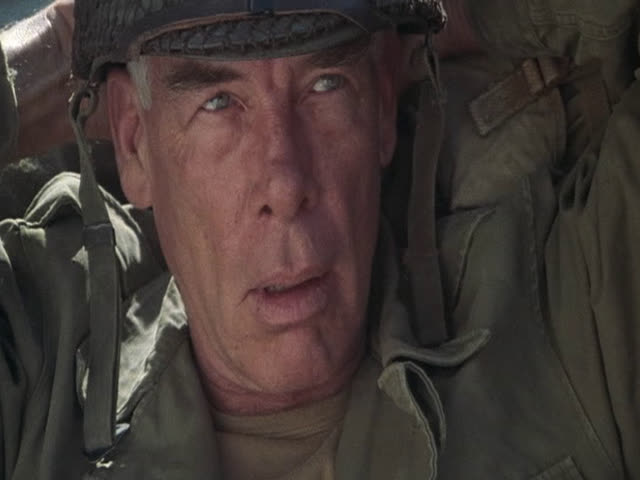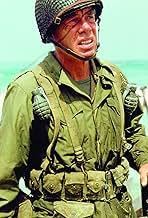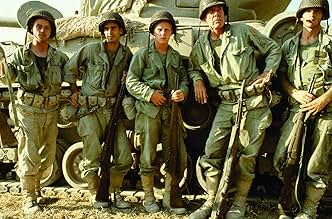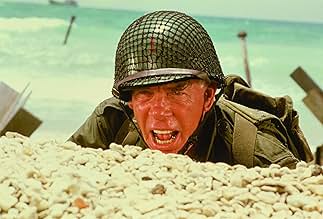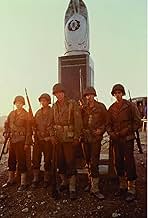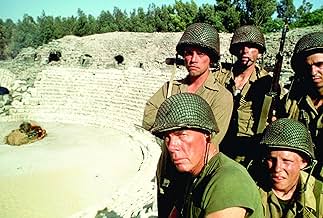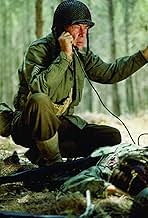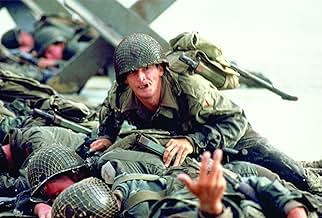IMDb रेटिंग
7.1/10
22 हज़ार
आपकी रेटिंग
एक सख्त हवलदार और उसकी पैदल सेना इकाई के चार प्रमुख सदस्य द्वितीय विश्व युद्ध II से बचने की कोशिश करते हैं, क्योंकि वे पूरे यूरोप की हर युद्ध में जाते हैं.एक सख्त हवलदार और उसकी पैदल सेना इकाई के चार प्रमुख सदस्य द्वितीय विश्व युद्ध II से बचने की कोशिश करते हैं, क्योंकि वे पूरे यूरोप की हर युद्ध में जाते हैं.एक सख्त हवलदार और उसकी पैदल सेना इकाई के चार प्रमुख सदस्य द्वितीय विश्व युद्ध II से बचने की कोशिश करते हैं, क्योंकि वे पूरे यूरोप की हर युद्ध में जाते हैं.
- पुरस्कार
- 2 जीत और कुल 2 नामांकन
Stéphane Audran
- Underground Walloon Fighter at Asylum
- (as Stephane Audran)
फ़ीचर्ड समीक्षाएं
I have seen this film quite a few times and have always been somewhat puzzled about it. There was no doubt that it had some of the most emotive scenes of any war film but seemed fractured. At times there seemed to be far more realism in it's morality than other films which was understandable since Sam Fuller actually served with The Big Red One at this time so much of it is a first hand account of events and attitudes. I have now read some of the background to the making of the film,I think in the L.A. Times,which now makes sense of the flaws in the film. Apparently Sam Fuller's budget was cut to the minimum by the studios after a regime change and the original screenplay as shot was hacked to death by the same studio against Fuller's wishes. This was not the film he wanted to make but he made it. And it was not the film that he shot as is indicated by the very complete screenplay notes he made. I think it is Richard Schickel, the noted reviewer of Time magazine, who has laboured to find the missing outtakes and to put the film together in its complete form with over 40 minutes added to the length. Apparently this more complete cut significantly improves the film and adheres to Sam Fullers screenplay more accurately. This new cut is now playing to limited audiences and, hopefully, will be available on DVD. It must be emphasized that this is not the film that Fuller originally wanted to make as the budget was cut by 75%. Some of the comments made by other reviewers on these pages are valid as to authenticity specifically in battle scenes. But Fuller did not have the budget that both the Longest Day and Saving Private Ryan had. It will be interesting to see the new cut. Hopefully it will flesh out what could have been one of the greatest Second World War films.
"The Big Red One" is an episodic war movie from maverick American filmmaker Samuel Fuller. Having only seen "Shock Corridor" from the director's oeuvre, I didn't know what to expect from him this time around. It becomes obvious pretty quickly that Fuller was never going to be a mainstream filmmaker. There's something about his style that's really off-putting. You empathise with the camera, not the actors. It's like they're at odds with each other.
This is not a bad thing, as you can tell from the enthusiastic reception Fuller's movies have gotten here on IMDB. But "The Big Red One" is also drastically cut down from the original print Fuller had, and I wonder if that's why it feels so disjointed.
Of course, it is supposed to be episodic, but I don't know. I didn't really get into it.
This is not a bad thing, as you can tell from the enthusiastic reception Fuller's movies have gotten here on IMDB. But "The Big Red One" is also drastically cut down from the original print Fuller had, and I wonder if that's why it feels so disjointed.
Of course, it is supposed to be episodic, but I don't know. I didn't really get into it.
Some movies are like buried treasure; someone manages to slip them into the theater, practically under every critic's nose, where they either thrive or famish and then vanish into the nearest video catalog. "The Big Red One" is one of those films. For all the hoopla created by "Saving Private Ryan" (another excellent film, which, in my opinion, had a better understanding of it's subject than a lot of it's critics gave it credit for), it owed a great deal to what Sam Fuller did a decade and a half before.
Lee Marvin, an actual WWII veteran himself, holds the film together as the tough but exhausted seargent. When he tells Mark Hamill (yes, Luke Skywalker, folks) that you don't murder animals, you kill them, the look on his face after that seems to say that he wished it could be some other way. It's hard to grab defining moments in this film as stand-out, but the two sequences that stick the most to my mind are the taking of the insane asylum and the horrors of the concentration camp. While other movies have focused on specific campaigns, "The Big Red One" deserves high marks for painting the broad canvass of the Second World War from the perspective of the guys who actually had to do the work.
Lee Marvin, an actual WWII veteran himself, holds the film together as the tough but exhausted seargent. When he tells Mark Hamill (yes, Luke Skywalker, folks) that you don't murder animals, you kill them, the look on his face after that seems to say that he wished it could be some other way. It's hard to grab defining moments in this film as stand-out, but the two sequences that stick the most to my mind are the taking of the insane asylum and the horrors of the concentration camp. While other movies have focused on specific campaigns, "The Big Red One" deserves high marks for painting the broad canvass of the Second World War from the perspective of the guys who actually had to do the work.
Less than 5 years after the Vietnam War officially ended, Director and acclaimed (but aged) film writer Sam Fuller attempted to recount the experiences he encountered while serving as an infantry soldier in the European Theatre of WW2. He had written many war scripts in his day, but fully realized that the world would not be ready for the true story of WW2, (He is quoted infamously as saying that a truly realistic war picture would involve live grenades and machine guns in the theatre). As his career ended and the world changed, he decided to make a go of his life long pet project... to make a film about the REAL story of WW2, about his own experiences in the Big Red One, or The First Infantry Division.
Too ahead of it's time to be appreciated during it's birth, and too dated to be appreciated in hindsight.
Some of the other user comments suggest this film is inferior to modern war films. Of course this film is not at the caliber of Saving Private Ryan or Band of Brothers in it's war scenes. How could it? When it is of a time closer to The Green Berets (John Wayne wins The Vietnam War) then to anything that came after it. Infact I would go as far as to say that this film broke the first ground, and made films like Platoon, Hamburger Hill, and Full Metal Jacket socially acceptable, and paved the way for films like Saving Private Ryan. Sure, Apocalypse Now has better War scenes, but is so fictional in it's scripting and "epic" war moments that it missed the point of the soldier on the front (and is widely regarded as being unrealistic by Vietnam Vets). The Big Red One tells the story from a WW2 Vet's point of view, Sam Fuller, and is wonderfully acted by a WW2 vet, Lee Marvin. Perhaps the last film to have such credits.
Sure, The Big Red One is cheesy, and harkens to a time when war films were more about the characters, then the violence. Still, there is something charming about the scripting, and Lee Marvin holds the movie together, while being surrounded by actors who were trendy on the cheap for 1979. The film also has technical inaccuracy, as in the Sherman tanks used as Panzers. However, the real strength of the film is in the script, and not in the battles. It breaks ground in it's defiance of films like the Sands of Iwa Jima. The soldier is not a clean sterile fighter for the holiest do goodynest army of all time, he is a human being locked in a battle for survival, and most importantly, he hasn't lost his sense of humor, or his libido.
Regardless of it's dated, almost 70's TV movie feel, I must mention that this film was first to show D-Day in a light other than that cast by The Longest Day, and uses some very clever cinematography to illustrate the violence. Sam Fuller consciously decided to make the battles less violent, and choose to focus on the characters instead, depicted the main characters as cynical and the fallen as humorous tragically short lived figures. This film also was first to introduce words like "replacement", "non-Coms" and "Krouts" to the war movie dictionary. It has the entire bangalore scene from Saving Private Ryan (although merely a concept compared to SPR) and shows North Africa, Italy, France, Germany, and a concentration camp. Before this film, WW2 was only depicted in such an epic manor that Bible films are seemingly tame.
THE BOTTOM LINE: This film was one of the last war pictures to emerge from the dying studio system, and is comparable in the way of battles to The Green Berets, Longest Day, etc. However it shines in the script category. and was first to show soldiers as young clumsy men, and not heroes. It attempts almost too much and that is it's strongest limitation. Still, a must see for war movie fans who can appreciate the older films. 7/10.
Too ahead of it's time to be appreciated during it's birth, and too dated to be appreciated in hindsight.
Some of the other user comments suggest this film is inferior to modern war films. Of course this film is not at the caliber of Saving Private Ryan or Band of Brothers in it's war scenes. How could it? When it is of a time closer to The Green Berets (John Wayne wins The Vietnam War) then to anything that came after it. Infact I would go as far as to say that this film broke the first ground, and made films like Platoon, Hamburger Hill, and Full Metal Jacket socially acceptable, and paved the way for films like Saving Private Ryan. Sure, Apocalypse Now has better War scenes, but is so fictional in it's scripting and "epic" war moments that it missed the point of the soldier on the front (and is widely regarded as being unrealistic by Vietnam Vets). The Big Red One tells the story from a WW2 Vet's point of view, Sam Fuller, and is wonderfully acted by a WW2 vet, Lee Marvin. Perhaps the last film to have such credits.
Sure, The Big Red One is cheesy, and harkens to a time when war films were more about the characters, then the violence. Still, there is something charming about the scripting, and Lee Marvin holds the movie together, while being surrounded by actors who were trendy on the cheap for 1979. The film also has technical inaccuracy, as in the Sherman tanks used as Panzers. However, the real strength of the film is in the script, and not in the battles. It breaks ground in it's defiance of films like the Sands of Iwa Jima. The soldier is not a clean sterile fighter for the holiest do goodynest army of all time, he is a human being locked in a battle for survival, and most importantly, he hasn't lost his sense of humor, or his libido.
Regardless of it's dated, almost 70's TV movie feel, I must mention that this film was first to show D-Day in a light other than that cast by The Longest Day, and uses some very clever cinematography to illustrate the violence. Sam Fuller consciously decided to make the battles less violent, and choose to focus on the characters instead, depicted the main characters as cynical and the fallen as humorous tragically short lived figures. This film also was first to introduce words like "replacement", "non-Coms" and "Krouts" to the war movie dictionary. It has the entire bangalore scene from Saving Private Ryan (although merely a concept compared to SPR) and shows North Africa, Italy, France, Germany, and a concentration camp. Before this film, WW2 was only depicted in such an epic manor that Bible films are seemingly tame.
THE BOTTOM LINE: This film was one of the last war pictures to emerge from the dying studio system, and is comparable in the way of battles to The Green Berets, Longest Day, etc. However it shines in the script category. and was first to show soldiers as young clumsy men, and not heroes. It attempts almost too much and that is it's strongest limitation. Still, a must see for war movie fans who can appreciate the older films. 7/10.
Perhaps I am an exception but this film really did nothing for me.
The premise is simple: the experiences of a US infantry squad led by Lee Marvin fighting in Europe and North Africa during WW II. It was supposed to be about the experiences of the men who fought but I didn't feel the film delivered that: none of the characters were really explored or given much depth, even the great Lee Marvin seemed distant and cold. There isn't too much dialogue, in fact there isn't too much of anything in this film. Its just there but it doesn't really give you much, it just leaves you cold. The plot is occasionally just plain weird and confusing, not the good kind of quirky type of weird but just strange for no apparent reason and with no charm to it.
The action scenes are average, nothing special but enough for their purpose. What annoyed me was that so many different locations were so obviously filmed in the same sandy country (Israel) and it just didn't come off as very convincing. I didn't believe that what I was being shown was really the place it was supposed to be. Its also a quiet film, with very minimal music which in itself isn't bad but just gave the whole thing a somewhat sleepy atmosphere. I wouldn't go so far as to say the film was boring, it wasn't but it just wasn't that attention grabbing either.
Its a film that is there but it did absolutely nothing for me. Others however might enjoy it.
The premise is simple: the experiences of a US infantry squad led by Lee Marvin fighting in Europe and North Africa during WW II. It was supposed to be about the experiences of the men who fought but I didn't feel the film delivered that: none of the characters were really explored or given much depth, even the great Lee Marvin seemed distant and cold. There isn't too much dialogue, in fact there isn't too much of anything in this film. Its just there but it doesn't really give you much, it just leaves you cold. The plot is occasionally just plain weird and confusing, not the good kind of quirky type of weird but just strange for no apparent reason and with no charm to it.
The action scenes are average, nothing special but enough for their purpose. What annoyed me was that so many different locations were so obviously filmed in the same sandy country (Israel) and it just didn't come off as very convincing. I didn't believe that what I was being shown was really the place it was supposed to be. Its also a quiet film, with very minimal music which in itself isn't bad but just gave the whole thing a somewhat sleepy atmosphere. I wouldn't go so far as to say the film was boring, it wasn't but it just wasn't that attention grabbing either.
Its a film that is there but it did absolutely nothing for me. Others however might enjoy it.
क्या आपको पता है
- ट्रिवियाThe bulk of the picture was shot in Israel, and director Samuel Fuller remarked that it was unsettling after a scene was shot when the German soldiers and SS troops would take off their helmets and Fuller would see them wearing yarmulkes; also, between takes they would be sitting around the set in full Nazi uniform speaking Hebrew or reading the Torah.
- गूफ़During the WW1 scene between the Sergeant and the officer in the dug-out, the Sergeant learns that the armistice had been signed 4 hours previously at 1100hrs, November 11, 1918. While talking with the officer, the sergeant is cutting a piece of red cloth in the shape of a number '1' which he says he will submit as a proposed insignia for the division. However the shoulder sleeve insignia for the 1st Division consisting of a red number "1" was already approved on 31 Oct 1918.
- भाव
[the troop stops before a memorial]
Johnson: Would you look at how fast they put the names of all our guys who got killed?
The Sergeant: That's a World War One memorial.
Johnson: But the name's are the same.
The Sergeant: They always are.
- इसके अलावा अन्य वर्जनIn 2004, film critic Richard Schickel restored this film to a new director's cut length of approximately 160 minutes. Using Samuel Fuller's production notes and the full-length, unexpurgated script, Schickel restored the footage that was forced to be cut by the studio upon its original 1980 release (which runs 116 minutes). The restored version's DVD release date is 3 May 2005. This longer, epic-length version is closer to Fuller's original vision for the film.
- कनेक्शनFeatured in A tout coeur: 7 मई 1984 को प्रसारित एपिसोड (1984)
- साउंडट्रैकHorst-Wessel-Lied
Written by Horst Wessel
टॉप पसंद
रेटिंग देने के लिए साइन-इन करें और वैयक्तिकृत सुझावों के लिए वॉचलिस्ट करें
विवरण
- रिलीज़ की तारीख़
- कंट्री ऑफ़ ओरिजिन
- भाषाएं
- इस रूप में भी जाना जाता है
- Más allá de la gloria
- फ़िल्माने की जगहें
- उत्पादन कंपनियां
- IMDbPro पर और कंपनी क्रेडिट देखें
बॉक्स ऑफ़िस
- बजट
- $45,00,000(अनुमानित)
- US और कनाडा में सकल
- $72,06,220
- दुनिया भर में सकल
- $72,06,823
- चलने की अवधि1 घंटा 53 मिनट
- रंग
- ध्वनि मिश्रण
- Dolby Stereo(original release)
- पक्ष अनुपात
- 1.85 : 1
इस पेज में योगदान दें
किसी बदलाव का सुझाव दें या अनुपलब्ध कॉन्टेंट जोड़ें


